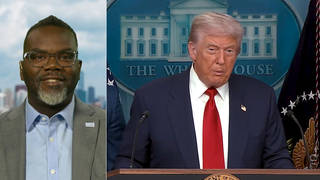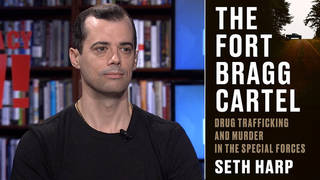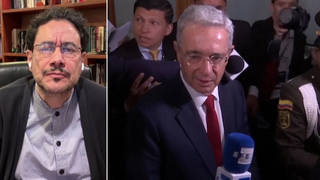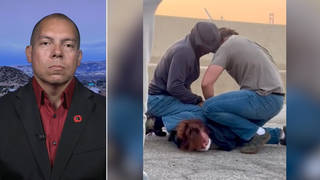
The trial of former Ku Klux Klan leader Edgar Ray Killen has begun in Philadelphia, Mississippi. He is charged with the 1964 murder of three civil rights workers. We speak with the brother and mother of two of the victims, Ben Chaney and Carolyn Goodman. And we speak with the journalist who has been investigating the murders for the past 16 years. [includes rush transcript]
Jury selection began yesterday in the 41-year-old case of three civil rights workers, murdered in 1964 by members of the Ku Klux Klan in Philadelphia, Mississippi. African American James Chaney, and whites Andrew Goodman and Michael Schwerner were part of the voter registration campaigns of Mississippi Freedom Summer.
They were driving to Neshoba County to inspect a church that had been burned by the KKK when deputy sheriff Cecil Price, a Klansman, stopped them for speeding and held them in jail until a mob could gather. The local Klan leader, Edgar Ray Killen, is now on trial for masterminding the murders and choosing the burial site. In 1967, the federal government tried 18 men for conspiring to violate the victims’ civil rights. Seven were convicted, but none served more than six years in prison. And Killen himself was released when his all-white jury deadlocked. We go down to Mississippi in a moment, but first, we hear from Carolyn Goodman, mother of Andrew Goodman. She spoke to us yesterday before leaving to attend the trial.
- Carolyn Goodman, mother of slain civil rights worker Andrew Goodman.
We go to Mississippi to speak with Ben Chaney, brother of James Earl Chaney. He is currently attending the retrial of Edgar Ray Killin. We also speak with Jerry Mitchell, who is an investigative reporter for The Clarion-Ledger. He has been investigating the murders of Schwerner, Goodman and Chaney for 16 years. It is largely because of his reporting that the investigation was re-opened.
- Ben Chaney, head of the James Earl Chaney Foundation named after his brother who was murdered during the 1964 Freedom Rides along with fellow civil rights activists.
- Jerry Mitchell, investigative reporter for The Clarion-Ledger. He has been investigating the murders of Michael Schwerner, Andrew Goodman and James Chaney for 16 years. It is largely because of his reporting that the investigation was re-opened.
Transcript
AMY GOODMAN: We go right now to Mississippi, but just before we do, we’re going to turn to Carolyn Goodman, mother of Andrew Goodman. We caught up with her yesterday just before she got on the plane to head down to the trial.
CAROLYN GOODMAN: Well, I’m going to Mississippi. And the reason I’m going is because there’s going to be a court case tomorrow, and there’s going to be a hearing about the people and the persons who were responsible for the death of my son, Andrew Goodman. And this happened 40 years ago, so it’s been a long time. But my husband, who is gone now, said, “Look, it may be a long time before this comes to trial, but it’s going to happen. And what’s more, I believe,” he said — and I agree with him — “that justice will be done.” And why? Because this is a country of laws, not of people. And that was 40 years ago.
AMY GOODMAN: Carolyn Goodman, mother of slain civil rights worker, Andrew Goodman. We’re joined now on the line by Ben Chaney, brother of James Earl Chaney. He’s in Philadelphia, Mississippi, attending the retrial of Edgar Ray Killen. Welcome to Democracy Now!, Ben.
BEN CHANEY: Good morning.
AMY GOODMAN: It’s good to have you with us. What is it like in Philadelphia, Mississippi right now?
BEN CHANEY: 90 degrees. A lot of humidity and no rain. They’re in the early stages of selecting a jury. They started yesterday morning at 9:00 a.m. Monday morning. And it’s a slow process. They have roughly 400 prospective jurors. And the prospective jurors are these souls that came in yesterday and appeared to be pretty diverse. I guess one in every four juror was a minority, either a Native American or an African American, and this is a county that’s roughly 67%, 68% white. So they had a pretty diverse group of people there yesterday, various backgrounds, economical, social status, education. And this process is going to continue again this morning. The judge made an announcement yesterday that he doesn’t think evidence will be introduced until Thursday.
AMY GOODMAN: How are you feeling right now, Ben Chaney, to go to Philadelphia, Mississippi? You were how old when your brother James Chaney was killed?
BEN CHANEY: I turned twelve over the summer. How do I feel? Well, you know, that’s sort of a mixed bag of feelings. This could be the beginning of something that could take it to the end. But just this particular trial, this trying Mr. Killen alone is not going to be enough. Everyone in the state knows who the murderers were. In fact, a confession from the 1967 trial was published in the state’s largest newspaper on Sunday, and it named all the murderers, including the rich and the powerful. But yet, the Attorney General refuses to go after anyone other than Mr. Killen, who I think is probably the most well-known unrepentant racist in the state.
AMY GOODMAN: We’re also joined on the line by Jerry Mitchell, in addition to Ben Chaney. Jerry Mitchell has been an investigative reporter with The Clarion-Ledger. He’s been investigating the murders of Mickey Schwerner, Andrew Goodman, and James Chaney for 16 years. Largely because of his reporting, the investigation was reopened. What did you find in this period?
JERRY MITCHELL: Well, the reason that Ben and the other families called the case to be reopened in 1999 was because of an interview that imperial wizard Sam Bowers had done. And Sam Bowers, the White Knights that he headed were responsible for at least 10 killings in Mississippi that we know of. But he said in the interview — there was a federal trial in 1967 on conspiracy charges, and Bowers was convicted in that trial. So what he said in this interview, which no one — which has never been made public, even to this day, was that he was quite delighted to be convicted and have the main instigator of the entire affair walk out of the courtroom a free man. And that’s what prompted — and he was talking about Edgar Ray Killen, whom they call locally “Preacher Killen,” because he’s a part-time preacher. And so that’s the reason that Ben and other families called on this case state authorities to prosecute this case.
AMY GOODMAN: Ben, at that time, when you were 11, what 10, 11, 12 years old?
BEN CHANEY: Twelve.
AMY GOODMAN: 12 years old. What did you understand? And do you remember the day that your brother’s body was found, along with Andrew Goodman and Mickey Schwerner?
BEN CHANEY: Well, the day that the bodies was found, I think, we got — that was at a — I was at a rally at a church in Meridian, and it was in the evening time. And I got a call, I had to come home. And the F.B.I. was there. They was explaining to my mother, they had found three bodies. What I remember most about the entire incident, though, I guess, is just watching my mother during those 44 days. You know, she would tell us stories about her Grandpa Jim, about other members of her family that disappeared, and stories that she told, that she witnessed, the things she witnessed when she was — since she was four years old. She would walk around the house, always humming, singing spirituals, and clean the house up, you know, from top to bottom, three or four times a day. So the thing that I remember most was the agony and the pain in her eyes. That was probably the saddest thing in the whole period. I didn’t have no concept of death until the funeral. I was pretty well protected as a kid, and I just had no real concept of what death was about, until my brother’s funeral.
AMY GOODMAN: Tell us about your brother’s funeral.
BEN CHANEY: It was sad. It was sad for me. That wasn’t a real funeral, because his body was so badly decomposed and just messed up. So they had a little memorial service that evening, but during that morning they had the burial at the cemetery. And it was when the coffin was being lowered into the ground that I realized that death was final. So it was a pretty sad time in the 1960s.
AMY GOODMAN: We’re talking to Ben Chaney, brother of James Chaney. He’s in Philadelphia, Mississippi for the retrial of the man who has been charged as the ringleader of the Klan, the Klan leader at that time. And Jerry Mitchell, investigative reporter for The Clarion-Ledger also with us. Jerry, you write a piece on cold cases, saying since 1989 authorities in seven states have re-examined 29 killings from the civil rights era, leading to seven arrests, 21 convictions. A U.S. Senator is studying possible legislation to create a unit within the Justice Department, like the unit of Office Special Investigations that went after Nazis, fugitives in this country, to handle the cold cases of the civil rights era. Tell us about these cases and this unit.
JERRY MITCHELL: Well, it’s a piece of legislation that Senator Talent in Mississippi is now looking at as a possibility. The thing with these particular cases, in some of these cases you’re often talking about the same people being involved in more than one incident. And so — but what happens, these things are so piecemeal. I mean, they end up having to be handled on a local level, which — but the problem is for a lot of the cases, for instance, F.B.I. records, the local people don’t have access to those F.B.I. records, in general. And so there needs to be some kind of coordinated effort to start with, because they don’t have access to that kind of information, and therefore, they need it. And even in this case that we’re talking about, for example, the state to this day has never seen the informant files in this case. And so there’s always going to have to be some kind of coordination with federal officials. And so I think the proposal is instead of having kind of these piecemeal efforts that kind of take place in various locales, have a more coordinated effort whereby you can kind of systematically look at these cases and see which ones can in fact be prosecuted.
AMY GOODMAN: Jerry Mitchell, can you talk about some of these specific cases, their circumstances?
JERRY MITCHELL: Sure, sure. The current — some of the current cases that are being looked at on a local level, you have the Emmett Till case in Mississippi is probably the most prominent one, who was, of course, killed in 1955, after allegedly wolf whistling at a white woman, you know. It’s just — just one of those cases, it’s just hard to believe today that the two guys who did it — and of course, there were others involved, too — were acquitted in 1955. An all-white jury acquitted them — acquitted them, and then, of course, months later they confessed the whole thing and said, “Oh yeah, we did it.” But there were other people who were involved in that, and there’s no question about that. So that’s what they’re looking at now, are there other people who could possibly be prosecuted. In that case, they’ve recently exhumed the body, done an autopsy, apparently found some bullet fragments. They are going to be testing for the DNA, as well, to verify in fact that’s Emmett Till. I don’t think there’s really a question about that. But in a court of law, you have to prove these things. And that was one of the things that the jury, the all-white jury when they came back said, 'Oh, well, the state didn't prove it was his body,’ which was crazy, because they proved it. The defense never, you know, disputed that, really.
AMY GOODMAN: We’re talking to Jerry Mitchell, investigative reporter, who is breaking open some of these cold cases, and Ben Chaney. Ben, can you talk about your feelings, even if there is a conviction in this trial, what that means to you? And who you think is responsible?
BEN CHANEY: You know, I think a whole lot of people are responsible, and unfortunately the state has not, I don’t believe, has made a sincere effort to bring these other individuals to justice. You know, I think this concept of having a coordinated effort to look at these cases is a great idea, but I’m looking at what happened in Birmingham and what’s happened with the Emmett Till case. The local D.A. in northern Mississippi requested the assistance of the Justice Department. And they took the case on. And that’s why the investigation is moving forward. The D.A. in Alabama — in Birmingham, Alabama, requested the assistance of the Justice Department, and they took the case on. Unfortunately, the D.A. in Mississippi for some particular reason decided that they didn’t need the real assistance of the Justice Department, as where a special prosecutor could be appointed. And that information that the Justice Department had could probably have been used, and even though we requested that he make that, that he follow that same procedure, and for that reason, I think that there is a need for some national coordinated effort to look at these cases and use that, and be able to have access to that information.
I think that, you know, I’ve always believed that if there was a jury, an impartial jury, impaneled anywhere in Mississippi to look at this case, they would convict. And I still believe that, and I think that if the District Attorney or the prosecutors here present the evidence they have aggressively and vigorously, I believe that the jury is going to convict. How do I feel about a conviction? I think that a conviction here is not the end, because there’s still individuals in this community where I’m at now who were involved in this case, and they’re walking around free and acting as if their lives are still intact, and nothing’s happening. So until each individual who participated in this case, and perhaps whether or not there can be some type of investigation to determine the role the State of Mississippi played to prevent a prosecution in the 1960s, so that this would not happen in the future again, I think that — you know, there’s going to be some delight in knowing that one individual has been convicted, if he is. But there’s not going to be no closure. You know, the case will still be open.
AMY GOODMAN: Finally, in the last few seconds, Jerry Mitchell, the attitude of people in Philadelphia, Mississippi, around this trial?
JERRY MITCHELL: Well, I think you have a split in attitudes here. This is — as you had elsewhere in Mississippi with some of these other cases, although this is certainly the highest profile case so far. You’ve got some people who think, “Oh, it’s been too long. Why can’t you, you know, leave this alone? And that happened 41 years ago, you know. We have — we have crime now, so let’s deal with that. Let’s not deal with that, what happened 41 years ago.” But then, other people in Mississippi feel, both black and white, feel that it’s the right thing to do.
AMY GOODMAN: Well, we’re going to have to leave it there. I want to thank you, Jerry Mitchell and Ben Chaney, speaking to us both from Philadelphia, Mississippi, where the trial is taking place right now of the leader of the Klan in the area 41 years ago, charged with the murder of Ben Chaney’s brother and Andrew Goodman and Mickey Schwerner.












Media Options